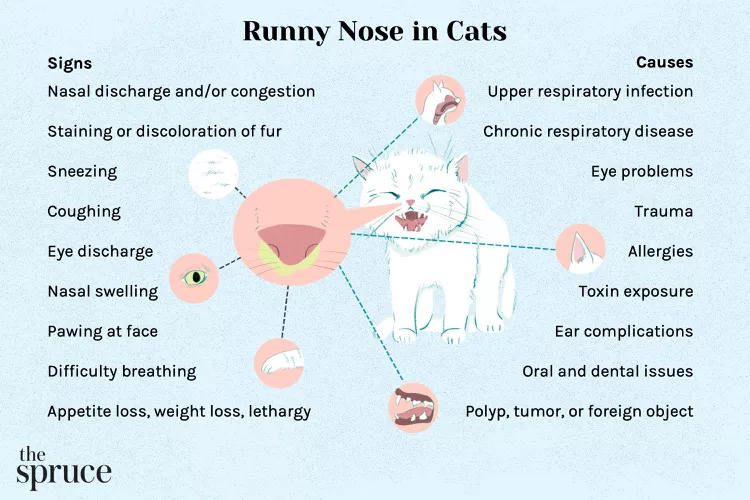Runny Nose in Cats: Causes and Treatment

A cat may have a runny nose for several reasons, including an allergy, upper respiratory infection, or more complex disease. Sometimes a cat's runny nose will clear up on its own, but other times, a trip to the vet will be necessary, especially if there are other symptoms present. Here are some possible causes for your cat's runny nose, other signs you may see, and what to do about it.
Why Does My Cat Have a Runny Nose?
Nasal discharge, or a runny nose, is not an illness itself but a sign of an illness or other health issue. A cat's runny nose is caused by something that irritates or inflames the nasal tissues. Rhinitis, or nasal inflammation, can lead to nasal discharge. There are many potential causes of runny noses in cats:
- Upper respiratory infection (viral, bacterial, fungal)
- Infectious diseases
- Allergies
- Eye infections or other eye problems (eye discharge may lead to excess nasal discharge)
- Oral and dental problems
- Trauma to the nasal cavity
- Toxic irritants
- Polyps
- Foreign body in the nasal canal (usually accompanied by sneezing)
- Cancer
Symptoms of Runny Noses in Cats
If your cat has a runny nose, you may notice other signs at the same time. Nasal discharge may come from one or both nostrils and may also switch between nostrils. If the nose is running and nothing else seems unusual, it doesn't mean there's not a bigger problem. However, if you see other signs of illness along with nasal discharge, it may be a more urgent issue. Watch for signs of health problems and contact your vet for advice.
- Staining or discoloration of the facial fur
- Nasal congestion
- Snoring
- Sneezing
- Coughing
- Nasal swelling
- Bloody discharge from nose
- Eye discharge or other eye issues
- Pawing at face
- Difficulty breathing
- Poor appetite
- Weight loss
- Lethargy
What to Do If Your Cat Has a Runny Nose
If you notice nasal discharge in your cat and there are no other signs of illness, then it's sensible to wait for a day or two to see if the runny nose clears up. If other signs appear, or the runny nose continues for a few days, contact your veterinarian to ask about the next steps.
If your cat has cold-like signs, your vet's office may want to schedule an appointment at a specific time to keep other cats away since many feline upper respiratory infections are highly contagious.
Warning
If your cat's signs come on suddenly and appear severe, or if there is bleeding from the nose, it's best to contact your vet's office immediately. If acute signs begin when your vet is closed, then contact an emergency vet for advice. This is especially important if your cat has suffered a trauma.
How Vets Diagnose the Source of Runny Noses in Cats
The first thing your veterinarian will do is perform a thorough examination of your cat. Be sure to share as much information as possible about the signs you have seen at home, as well as your cat's current and past medical history. Let your vet know about your cat's environment, diet, and any medications or supplements you are giving your pet.
Your vet may recommend diagnostic tests, depending on the exam findings. Blood and urine testing will provide information about your cat's organ function and overall health. X-rays of nasal passages will allow the vet to detect some abnormalities. Your vet may refer you to a veterinary specialist for rhinoscopy if a nasal mass or foreign body is suspected. Advanced imaging, such as CT or MRI, may be needed in some cases.
How to Treat Runny Noses in Cats
Treatment for your cat's running nose depends on the cause. In some cases, your veterinarian will send you home with medications and home care instructions. However, very sick cats may need to be hospitalized for supportive care.
- If your cat's runny nose is due to an infection, then medications may be necessary to clear it up. This may include antibiotics, antifungal drugs, or antiviral medications depending on the source of the infection.
- Allergies can often be managed with antihistamines and through reduction of the allergen in your cat's environment.
- If the nasal discharge occurs due to dental or oral problems, the vet will need to put your cat under anesthesia to address the problem, which may include tooth extractions.
- Cats with nasal foreign bodies, polyps, or tumors may need to have a rhinoscopy to remove the source of irritation.
- If cancer is found, the cat may need chemotherapy and/or radiation therapy.
- Surgery may be needed to address traumatic injuries or cancer.
Prognosis for Cats With Runny Noses
The prognosis for cats with runny noses varies based on the underlying cause.
Cats with infections tend to respond well to medications and supportive care. However, infectious agents, particularly viruses, can cause chronic nasal discharge and other issues. For chronic or recurrent problems with nasal discharge, your vet may recommend a consultation with a veterinary specialist.
Most cats recover well after a foreign body or polyp is removed, but damage to the nasal passages may lead to chronic inflammation.
The prognosis for cancer depends on the type and severity. A veterinary oncologist is the best person to consult after a cancer diagnosis.
How to Prevent Runny Noses
The best way to prevent a runny nose in your cat is to try to stop illnesses and injuries from occurring in the first place. Outdoor cats are at a higher risk for injuries and catching contagious infections, so keeping your cat indoors can greatly reduce the risks. Also, be sure your cat gets routine wellness exams and regular vaccinations as recommended by your veterinarian.